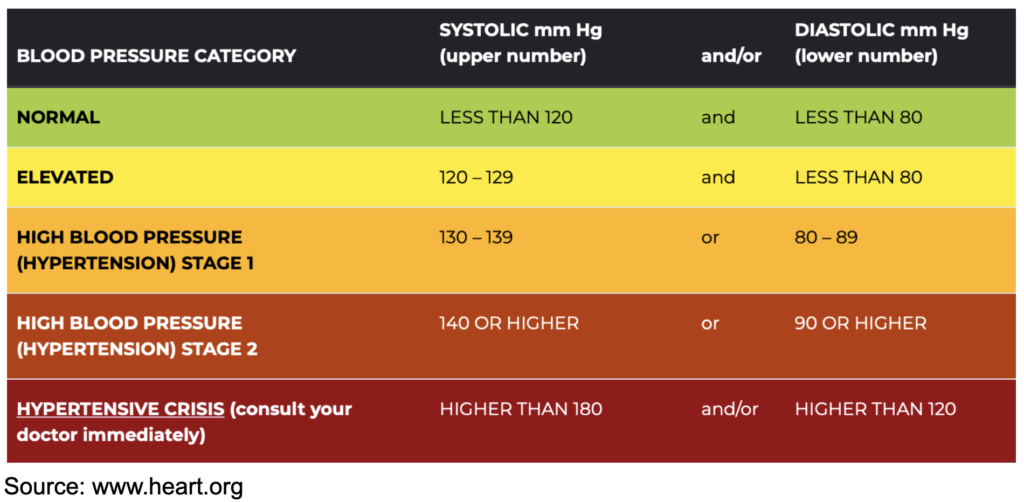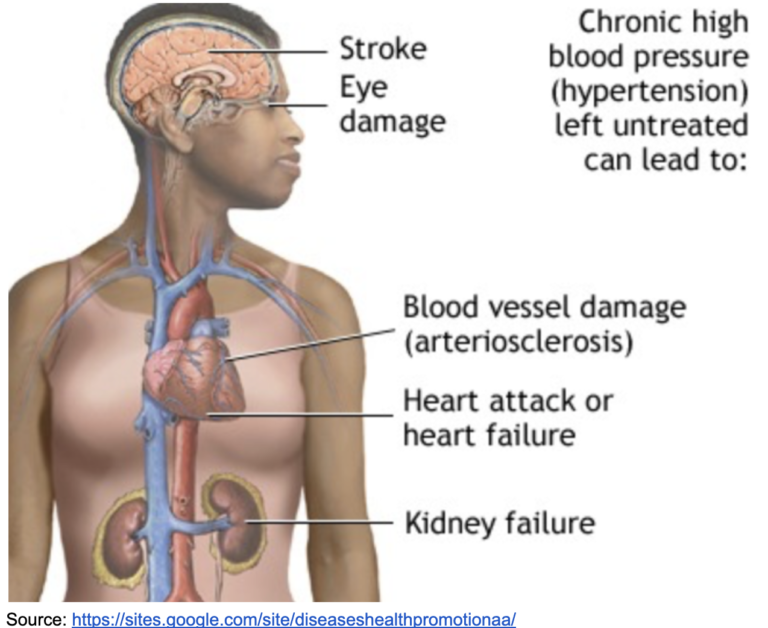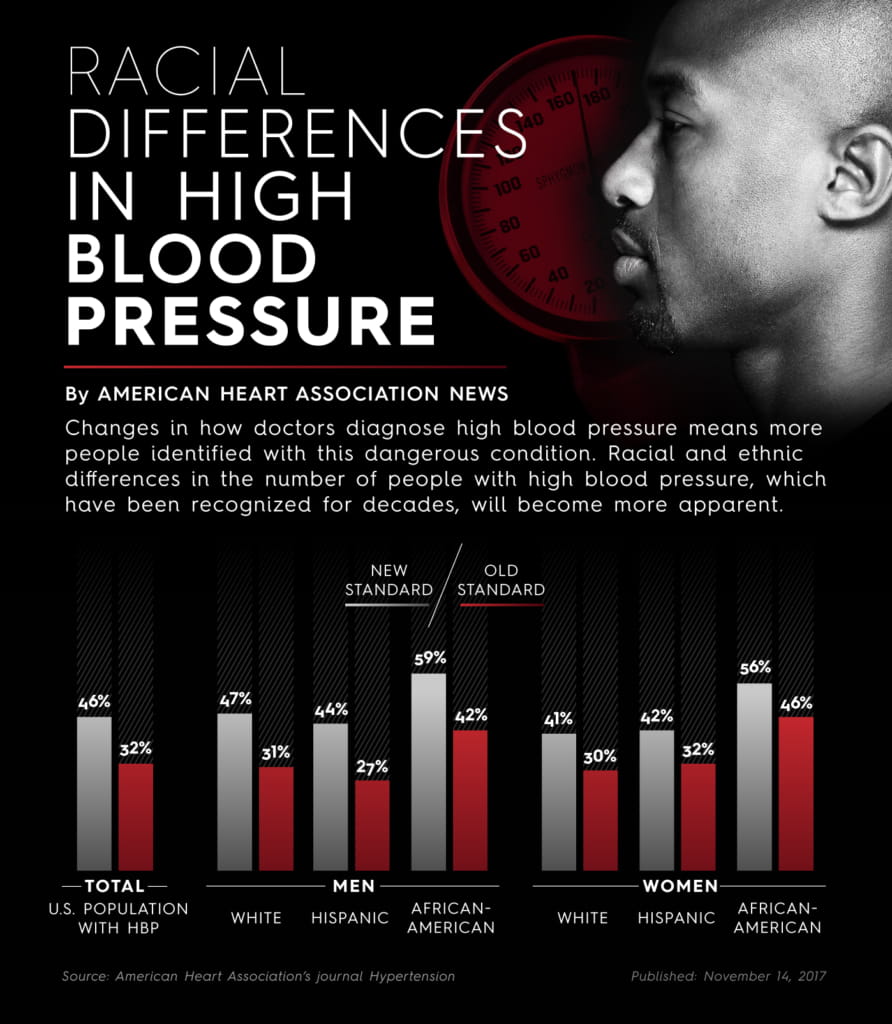High Blood pressure
symptoms sometimes don't show themselves
Practice prevention and get regular BP readings to get ahead of this “silent” killer.
high blood pressure
Symptoms sometimes don't show themselves
Practice prevention and get regular BP readings to get ahead of this “silent” killer.
What is high blood pressure?
- Blood pressure is the pressure of blood pushing against the walls of your arteries. Arteries carry blood from your heart to other parts of your body. (CDC)
- Hypertension is the medical term for high blood pressure. This means that the blood applies too much force against the walls of the blood vessels.
- The higher your blood pressure, the higher your risk of health problems such as heart disease, stroke, or heart attack.
- High Blood pressure is a “Silent Killer”.
- You may not feel that anything is wrong, but high blood pressure could be quietly causing damage that can threaten your health. The best prevention is knowing your numbers and making changes that matter in order to prevent and manage high blood pressure.
symptoms
High blood pressure (HBP) is sometimes referred to as the “silent killer” because people usually do not experience any symptoms. That is why it is important to regularly check your blood pressure, especially if you are at risk for HBP.
Risk Factors
- Hypertension (HBP) is more common in those over 60 years old.
- HBP affects more people of color than whites.
- Being overweight or obese is a key risk factor.
- Consuming large amounts of alcohol or smoking tobacco increases your risk.
- Men are more prone to hypertension at a younger age, while its prevalence tends to be higher in older women.
Ways to Prevent
- Maintain a healthy weight
- Exercise regularly.
- Eat a healthy diet.
- Reduce sodium in your diet.
- Limit the amount of alcohol you drink.
- Quit smoking.
- Cut back on caffeine.
- Reduce your stress.

treatment options
In addition to lifestyle changes, drug therapy is also commonly prescribed for the treatment of high blood pressure.
People with blood pressure higher than 130 over 80 may need medication to treat hypertension.
Drugs are usually started one at a time at a low dose. Side effects associated with antihypertensive drugs are usually minor.
- A range of drug types are available to help lower blood pressure, including:
- diuretics, including thiazides, chlorthalidone, and indapamide
- beta-blockers and alpha-blockers
- calcium-channel blockers
- central agonists
- peripheral adrenergic inhibitor
- vasodilators
- angiotensin-converting enzyme (ACE) inhibitors
- angiotensin receptor blockers
To avoid interactions, make sure to carefully read labels, especially before taking any over-the-counter (OTC) medications, such as decongestants.
Understanding blood pressure readings
- Hypertension, or high blood pressure, is dangerous because it can lead to strokes, heart attacks, heart failure or kidney disease. Treatment for high blood pressure reduces incidents of stroke (35 – 40%), heart attack (20-25%) and heart failure (50%+).
- Your blood pressure reading has 2 numbers. The first is the systolic, which measures the pressure on the blood vessel walls when your heart beats. The second number is the diastolic, which measures the pressure on your blood vessels between beats when the heart is at res


Youth are at risk
According to the CDC, about 1 in 25 youth ages 12 to 19 have hypertension, and 1 in 10 has elevated blood pressure. High blood pressure in youth increases the risk of health problems, such as heart disease and stroke, later in life.
HBP is more common in youth with obesity. Thus, a healthy diet and regular physical activity are essential for keeping children at a healthy weight. If you believe your child is at risk for HBP, talk to your primary care provider.

STATISTICS FOR PEOPLE OF COLOR

- The prevalence of high blood pressure (hypertension) in African-Americans in the United States is among the highest in the world. More than 50% of non-Hispanic African-American men and women have high blood pressure. (CDC)
- For African-Americans, high blood pressure also develops earlier in life and is usually more severe.
Learn more about the Stats at GRAAHI's Health Equity Index
Links, Tools, Resources
Websites
https://www.ncbi.nlm.nih.gov/pmc/articles/PMC4108512/
Grand Rapids/Kent County/Michigan Resources:
https://www.americashealthrankings.org/explore/annual/measure/Hypertension/state/MI
https://www.heart.org/en/affiliates/michigan/western-michigan
Latest Advances, Clinical Trials & Breakthroughs in High Blood Pressure:
https://www.ncbi.nlm.nih.gov/pmc/articles/PMC8949859/
https://www.sciencedaily.com/releases/2022/12/221221090550.htm
https://bpspubs.onlinelibrary.wiley.com/doi/10.1111/bcp.14825
https://www.uptodate.com/contents/whats-new-in-nephrology-and-hypertension